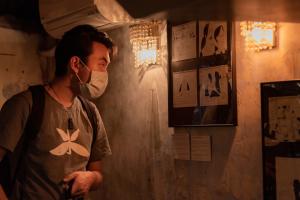Conflictual Collaboration: Citizen Science and the Governance of Radioactive Contamination after the Fukushima Nuclear Disaster
In the aftermath of the 2011 Fukushima nuclear disaster, citizen scientists collectively tracked and monitored residual radioactivity in Japan, legitimizing alternative views to an official assessm
Radioactive Performances: Teaching about Radiation after the Fukushima Nuclear Disaster
Following the 2011 Fukushima nuclear disaster and its release of radioac- tive contamination, the Japanese state put into motion risk communica- tion strategies to explain the danger of radiation e
Exhibition: Pollution, Data, Activism, 03.20.2021

This collection documents a talk and exhibiton about the Formosa Plastics Global Archive, held on March 20, 2021 at 柏林廢墟Tacheles in Taipei, Taiwan.
Photo Essay: Exhibition 03.20.2021
Photos from a talk and exhibiton about the Formosa Plastics Global Archive, held on March 20, 2021 at 柏林廢墟Tacheles in Taipei, Taiwan. All photos by Jiao Enguan 焦恩光.

pece_annotation_1473624286
joerene.avilesThe main argument was that there are "biosocial phenomena" or "structural violence" that lead to the tendency for certain diseases or lack of treatment in populations, particularly those in poverty. Their three major findings were: they can make structural interventions to "decrease the extent to which social inequities become embodied as health inequities", proximal interventions can reduce premature morbidity and mortality, and structural interventions "can have an enormous impact on outcomes.
pece_annotation_1474156249
joerene.avilesStephen Collier is an Associate Professor of International Affairs at The New School in NYC. He has a Ph.D in Anthropology from U.C. Berkeley and has conducted research in Russia, Georgia, and the U.S. His expertise is in political systems (post-socialism and neoliberalism), infrastructure, social welfare, and contemporary security. His knowledge in infrastructure and politics gives him a more top-down perspective of emergency response; Collier can assist with creation of organizations and groups for large scale emergencies that would require international collaboration.
Andrew Lakoff is an Associate Professor of Sociology at the University of Southern California, and is an anthropologist of science and medicine. He research is in globalization processes, human science, and the implications of biomedical technology. He has a similar position in emergency response as Collier, where he sees global, political, and technological interactions that would effect how we prepare and respond to international emergencies. He's written essays and other books on emergency preparedness such as "The Risks of Preparedness: Mutant Bird Flu" and "Disaster & the Politics of Intervention".
pece_annotation_1475367670
joerene.avilesThe author is Didier Fassin, a French sociologist and anthropologist who was trained as a physician in internal medicine. He developed the field of critical moral anthropology and currently does research on punishment, asylum, and inequality. This research looks at the social and political forces that affect public health trends, so is not directly involved in emergency response.
pece_annotation_1476050375
joerene.avilesThe policy was created in 1988; it was created to support previous legislation, such as the Disaster Relief Act of 1970, which was amended in 1974 by President Nixon.

Translation of the event description into Mandarin.